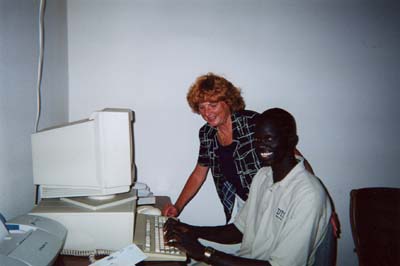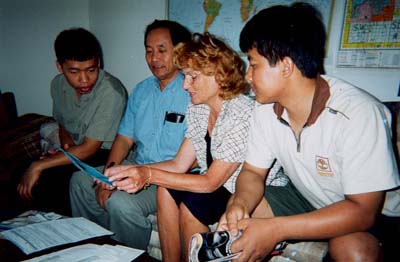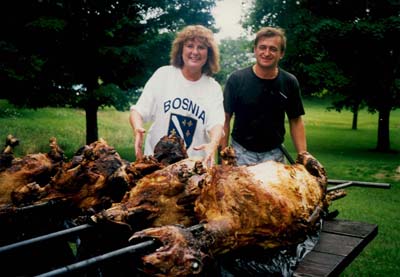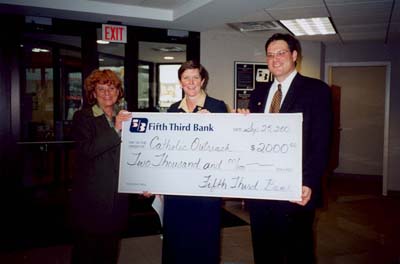
For Carol Russo, it all began in April 1975. Sitting in her living room, surrounded by her husband's deer trophies and pictures of family, she watched the television news. Desperate Vietnamese trying to board overcrowded American helicopters. Thousands of refugees massed on the decks of U.S. Navy aircraft carriers. Orphans being loaded onto planes. At 37, she was a homemaker and mother of five. She lived in a two-story house, with a swimming pool in the back, on a quiet leafy street in Grand Rapids, Michigan. Her husband, Joe, a first generation Italian, ran and owned an Italian restaurant and a beauty salon. Though Carol's grandparents were from Poland and Sweden, foreign cultures for the Russo family consisted basically only of ties to Italy. But as Saigon fell and a massive exodus of people began, she realized that she had finally found what she was meant to do.
 |
| Carol Russo teaching computer skills to John Mairol Deng, a Sudanese refugee, in Grand Rapids, Michigan. |
A Catholic, Russo called her local diocese and asked what they were planning to do for Vietnamese refugees. She was told that about 600 were coming to Grand Rapids that year to be resettled by Catholic Human Development Outreach, a local affiliate of the US Catholic Conference of Bishops. So she volunteered. Petite and freckled with bright red hair that curls around her face and shoulders, Carol Russo literally bounces with energy and never seems to lose her temper. "I really can't tell you why my relationship with refugees is so special," she mused. "I don't understand it. It's just there. It's just part of my life. It's defined my life since 1975 and it's my purpose."
Since 1975, Russo, now 63 years old, has fostered and raised two Vietnamese refugee youths and has also learned Vietnamese. She has worked as a case worker, then a case manager. By 1999, she had become the program manager for refugee resettlement at CHDO in Grand Rapids. And Grand Rapids had become a mirror of world upheavals. In the almost 30 years since the fall of South Vietnam, it has transformed itself from a Dutch European, mostly white town into a city of half a million, a multi ethnic vibrant hub of Vietnamese, Amerasians, Russians, Poles, East Germans, Romanians, Eritreans, Ethiopians, Bosnians, Croats, Afghans and now more than 200 Sudanese.
Grand Rapids opened its doors to refugees not because it was more humanely inclined than other cities but because, as Carol Russo saw it, the largely conservative population realized refugees helped build the economy. As soon as they arrived, they got jobs, they paid taxes, they became consumers. They bought food, they bought cars, they built homes. Grand Rapids was attractive because it was large enough to offer the amenities of urban living but small enough not to have a high crime rate. The refugees not only settled there but attracted compatriots from other American cities, particularly the Bosnians, who arrived in secondary migration waves. In the early 1990s, the first Bosnian family arrived in Grand Rapids. By 2001, there were more than 12,000 Bosnians living in Western Michigan.
 |
| Carol Russo helping Burmese refugees in Michigan understand the complexities of filling out forms. |
In the United States, refugee resettlement is a multi-million dollar business. There are 10 federally contracted resettlement agencies that help refugees start a new life in cities across the country. Before September 11th 2001, the U.S. resettled more refugees than all other countries in the world combined. Just under 70,000 entered the United States in 2001, and at its height, the program brought in 207,000 in 1980. It is a program funded and monitored by the US State Department and the Office of Refugee Resettlement (under the Department of Health and Human Services). The federal government has set a wide range of rules and regulations that the agencies must follow that run the gamut from finding acceptable housing and paying the first four months rent to helping in job searches, language training, education and health care. Assistance periods vary from 60 days to as long as a year. Because the ability to monitor on a case by case basis is not easy, the State Department gives out minute instructions that range from the number of chairs and beds and kitchen utensils per apartment to the length and type of orientation programs the refugee is to receive.
Refugees fleeing war and persecution are the world's most vulnerable. Most have lost everything they own and do not even speak English. Yet all these guidelines do not necessarily guarantee successful resettlement. In August 2000, for example, Catholic Charities in Atlanta ( a local affiliate of USCCB) was accused of housing refugees in sub-standard apartments. And Russo says the business has its share of tales of local agencies basically dumping their bewildered charges after picking them up at the airport or not providing them with any of the required support systems. Russo remembers one Eritrean refugee family arriving in Chicago where they were just handed a check by the case worker at the airport and had to find their apartment on their own. There was no food in the apartment and they were too scared to go out for the first few days. Russo believes you can put in place a vast array of safeguards but ultimately it's the individual case worker that makes the difference.
 |
| Carol Russo at a goat roasting feast for Bosnian refugees, in Grand Rapids, Michigan. |
USCCB is by far the biggest resettlement agency and Michigan is its biggest state for refugees. Under Russo, the refugee program has raked in many awards. The State Department considers it one of the most successful programs in the US. In 2001, Russo, with 14 full-time staff and two interns and a budget of about $1 million, raised an additional $800,000 (of which $100,000 was in cash, the rest in donations) as part of a refugee program that gets matched with federal funds.
Russo's recipe for success? She requires her staff to follow even more detailed instructions than those handed out by the federal government. But she claims it begins with her basic rule. She believes if you can't establish a level of trust at the beginning, the relationship the refugee has with the agency is almost doomed. The bottom line is all about human contact.
Her youngest son, Paul, says there never was a quiet dinner at home as he was growing up but a constant revolving door of refugees dropping by and joining the family meal. Russo has asked a doctor for a virgin certificate required by the father-in-law of a Vietnamese bride-to-be. She has helped an Eritrean woman find shelter from an abusive husband and then witnessed him stab his wife to death as they both were trying to escape him. Most recently, as 215 young Sudanese men, known as Sudan's "Lost Boys" have come to settle in Grand Rapids, she has been dubbed "Mom" by many of them.
The State Department provides the agency with only $700 per refugee to cover the first few months of expenditures. The agencies rely heavily on fundraising. CHDO spends a lot of energy and time recruiting volunteers and galvanizing the community. When the first groups of Sudanese arrived in the middle of a Grand Rapids winter, Russo, her case workers and volunteers were at the Gerald Ford Airport to greet the youths. Huge hand painted welcome banners were displayed, home video cameras were rolling and warm jackets were handed out to every arriving refugee. For the first four months, CHDO paid the youths' rent – four boys in a $600 a month apartment. At the apartment, the volunteers already had prepared a welcome meal. Even though the apartment temperature hovered around 80 degrees, the Sudanese kept their jackets on as they delved into macaroni and cheese, creamed corn, roasted chicken and rice.
Home for the Sudanese felt more like Sarajevo than mid-west America. Serbo-Croatian floated through the carpeted stairwell and the parking lot of the apartment complex. Slavic-looking men stood chatting and chain-smoking cigarettes. Within months, as the Sudanese kept on arriving, it became a mini-Dinka town, a way-station between the refugee camp in Kenya and the Midwest, with towering ebony men playing basketball and soccer with Bosnian teenagers. As in a camp, they congregated, sometimes as many as 20 in a tiny apartment, the steam from endlessly boiling rice fogging the windows, the rhythmic drums of Dinka music accompanying conversation and tall, lanky teenage bodies just about everywhere.
The first three days for the refugees were a marathon of information overload. Every instant was packed with novelty. In the week after their arrival, the resettlement agency is required to get the refugee registered for food stamps (it takes 7 to 10 days), a social security number, and Medicare. They would be getting $200 a month for four months as a personal allowance. There was a cultural orientation. Russo's staff talked to them about health forms to fill out and doctors and how they would help them get jobs. They were taught how and where to shop, how to cook indoors (their first time ever with a gas stove), even how to use a telephone.
Russo wanted to make sure that first week had fun moments too. There was an outing at a local bowling alley and a welcome party at a local gym with a huge "Welcome to America" cake. The youth sang Dinka songs and mingled easily among the crowd of volunteers and their kids. The party was just as much for the volunteers to experience the Sudanese as for the Sudanese to experience Americans.
 |
| Carol Russo receiving a major donation for refugees. |
"It's changed my life," said Denise Palma, a 46-year-old teacher and the first CHDO volunteer for the Sudanese. She articulated what was almost a mantra among volunteers, the notion that meeting the Sudanese youth was a gift. They were so polite. They were teenagers that communicated with adults. They were different. They gave Americans back their sense of wonder. "I saw the article in the paper and it just touched my heart, said Palma. " It makes you realize how blessed you are. I am always getting. We're supposed to give. When I wake up in the morning, I can't wait to call and talk to them. They give me back joy. I just help them with simple things. They are not impressed with things like movies. They like to share their culture. I know now that my daughters are worth many cows. They are part of my life like my children."
As the volunteers mingled Russo was busy trying to build another bridge between Africa and America. For two days, one of the youth, a 19-year-old Nuer named Marco, had grown increasingly despondent and quiet. At first he had just complained of a fever and flu-like symptoms. The case worker, Trinh Watts, had taken him to a doctor and aspirin had been prescribed. But Western medicine wasn't working. Finally, Marco confided in Trinh that he was dying because a witch doctor in the refugee camp had cursed him the day he left. He would die within days, he said. Though he was a baptized Catholic, like many Sudanese, Marco's beliefs were a mixture of old world and new, a place where witch doctors coexisted quite easily with Christianity. Trinh, a tiny Cambodian-French-Vietnamese who had married an American serviceman in Vietnam, spent hours trying to cheer him up and convince him that the curse could not reach him in Grand Rapids. Nothing worked.
At the bowling alley outing, Marco, sat alone, a black woolen cap pulled low over his forehead, staring at the floor. Trinh took her gold cross from around her neck and gave it to Marco saying it had always protected her. He still grew more despondent. So Russo decided it was time for a major de-hexing ceremony. She may have known little about Dinka culture, but she trusted that ceremonies were cross-cultural. She called in a friend who was a Catholic priest. Alone in a cavernous Catholic church built like a huge amphitheater, the priest, in white vestments, and Marco walked over to the black marble baptismal font. He blessed Marco with holy water, anointed him with oil and performed a very vocal laying on of hands. Then the two walked over to the altar. They knelt, bowed heads touching and prayed. Just another way that a refugee was finding a home in America.
©2004 Donatella Lorch
Donatella Lorch, a former correspondent for Newsweek, examined child refugees during her Patterson year.